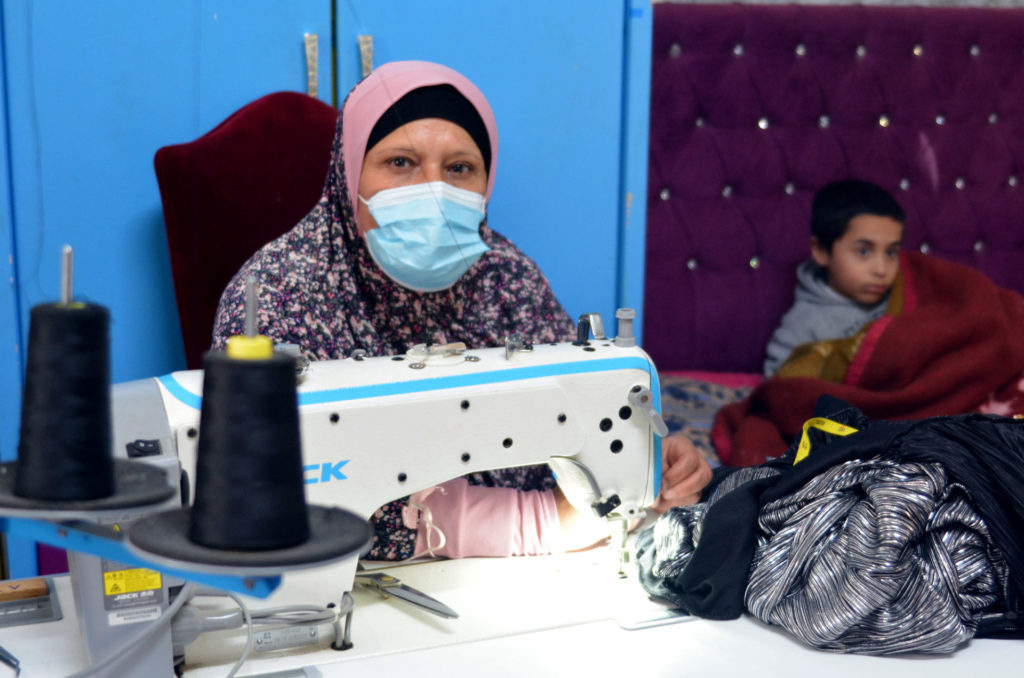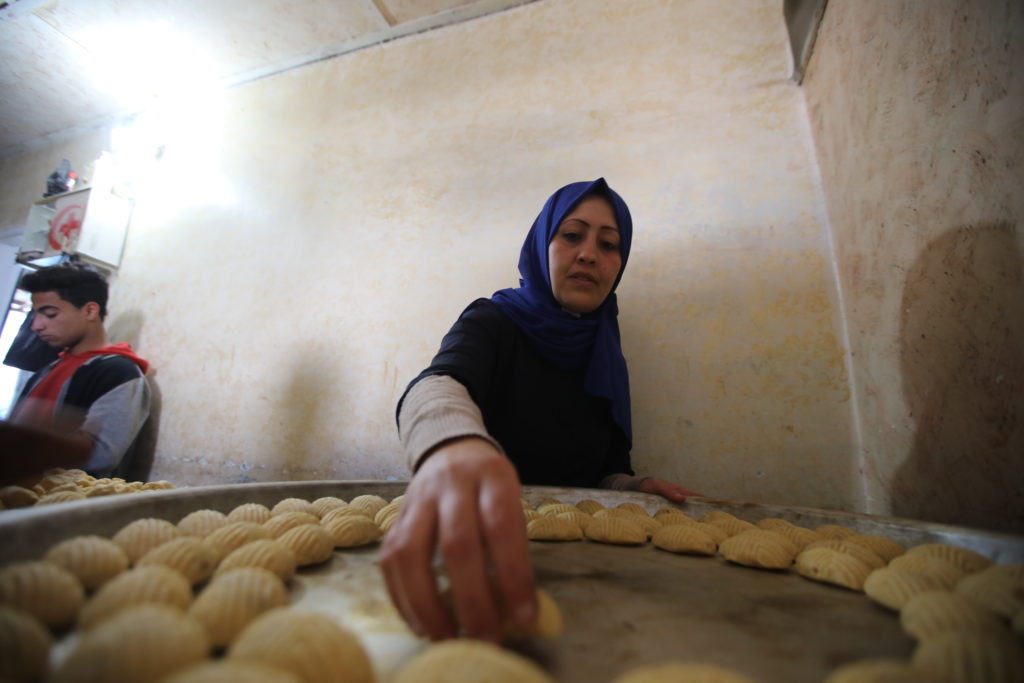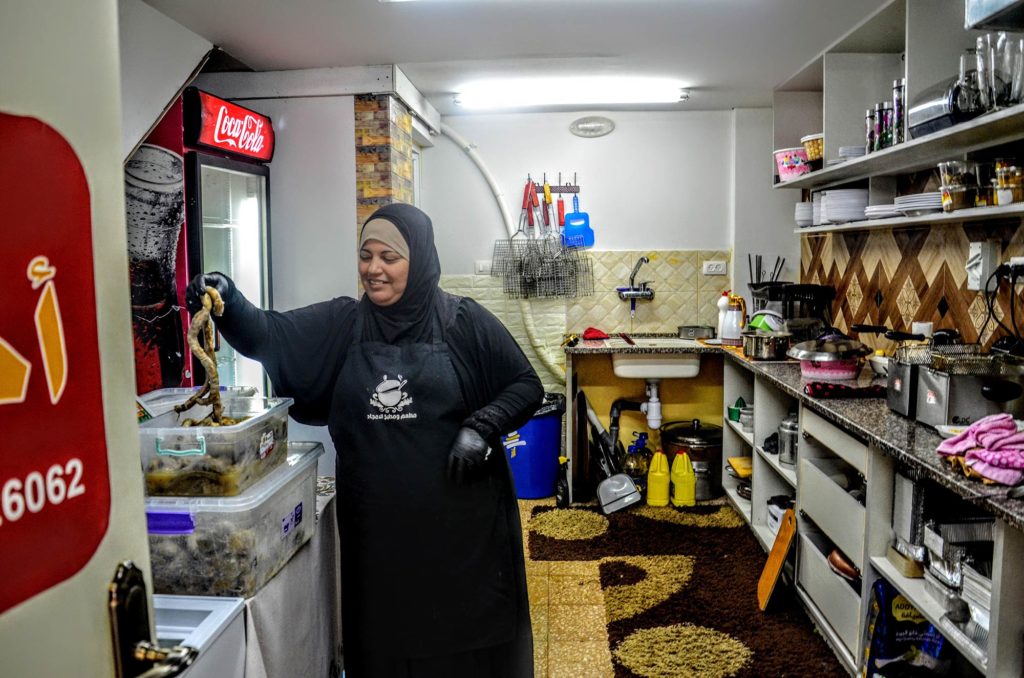Women Can — And Have!
Posted in: Programs
The vision for Women Can began in 2019 when our staff in Palestine saw a unique opportunity to support and mentor women with entrepreneurial vision. The project began in the West Bank and expanded to Gaza in its third year and has supported women in Nablus, Qalqilya, Ramallah, Salfit, Jenin, Tulkarem, and central Gaza.
The program offers business training and seed money for women to start or expand their small enterprises. These families are among the most vulnerable in Palestine. The women of Women Can are widows, divorcees, or have husbands unable to work. They have limited access to livelihood opportunities in an environment where only 23% of women are employed. Led by my dear colleagues Naser Qadous and Nairman Othman, Women Can 3.0 is having a strong, measurable impact on the lives of women and their families in Palestine. Since we launched the program four years ago, in partnership with Islamic Relief USA, through to the end of Women Can 3.0 in July, 2023, we will have empowered an estimated 570 women-headed families to have financial stability, increased confidence, and sustainable livelihoods.


Let me share a story. A participant of Women Can in the West Bank, Ruqayya, had dreamed since her teenage years of owning her own sewing business. She took sewing training classes to achieve this goal. But then, Ruqayya’s life took an all too familiar turn — an unexpected marriage. Her family arranged for her to marry a much older man, who lived many kilometers away. She had no choice but to give up her dreams. Thirty years and three kids later, her husband walked out on her, leaving her financially unstable and far from her family and hometown. She had to ask neighbors for money just to put bread on the table.
When Ruqayya joined the Women Can program, she saw a way to rekindle the aspirations of her youth. Through the program, she received material support, trainings, and guidance on running her own tailoring business. She now sees 40-50 clients per month, and her skills are showcased not only through tailoring but through designing custom dresses for special occasions.
She has become a household name in her village, earning enough to provide for her family. In her own words, Ruqayya explained that “it is such a powerful feeling of freedom to no longer feel trapped and helpless.” She added that “[her] husband’s departure was the best thing that could have happened to her.” We see her confidence come through as she speaks. She told us: “No matter what life throws at you, a woman with a mission is unstoppable. But this lesson was especially important for my daughters, because it gave them a crash course on independence in what remains a patriarchal society.” Anera’s Women Can program is fueled by this spirit and devotion.
Ruqayya’s story is one of many that shows the impact of Women Can for the women-headed families served by this project. Women’s confidence in their businesses and in themselves is transformed. Families experience higher economic security. And their businesses have a greater impact on their communities by stimulating local economies and creating new market linkages.
Let me tell you another story. Kifaah is a 33-year-old resident of Gaza and a graduate of Women Can. Kifaah and her family had fallen into hard times. Kifaah once worked as a baker alongside her husband. But when her husband fell ill, she had to take a five-year hiatus from baking to care for him. In 2022, Kifaah joined our Women Can program to revitalize her baking career and to provide for her husband and five children, aged 9 to 17 years old.


Kifaah’s speciality is ma’moul, an Arabic cookie filled with sweet dates or nuts. With the business skills she learned and confidence she gained from her training under Women Can, Kifaah now works at Al Nusairat Market in central Gaza. There, alongside her husband and eldest son, she makes roughly 185 kilograms, or 400 pounds for my imperial friends present, of cakes and ma’moul cookies every day. And her reputation is growing in her community – one customer noted that Kifaah’s pastries are “unmatched.”
Through the additional skills Kifaah gained through Women Can, she now earns 250 shekels, or $68 a day, which amounts to nearly one-third of what the average Gazan family earns in one month. And Kifaah’s journey has just begun. Through the business training, life skills, and empowerment that she gained from Women Can, her dream is to open her own, even larger storefront. Based on her impressive achievements so far, we know that Kifaah will achieve her dreams.
We have found through the last four years that the lasting effects of this program go beyond the successes of these businesses. Women share with us that they have higher levels of confidence in themselves. They are more financially secure and are not as reliant upon other family members to support their households. This has allowed many participants to begin standing up for their rights within their families, as women begin to perceive themselves from a position of strength. Women Can also gives participants new avenues for creativity. We begin every cohort by finding out from each woman what their interests are and help them to achieve them. No one cohort is the same. We have helped to support a wide range of businesses, including sheep farms, food catering, sewing, beauty salons, grocery and convenience stores, photography, car washes, housewares, shoes, and dry cleaning.
And the results have been remarkable. For instance, one of our entrepreneurs, Nihaya from Qalqilya, expanded her small restaurant and now has more than 50 employees working for her. She has achieved so much success that she now sponsors five underprivileged families in her community. The women of Women Can are now earning between $90 and $900 per month through this intervention, with the average business earning $246 per month in its early stages. This income increases as the businesses mature, as women have more experience and have built their reputation.To put this into perspective, the average family in Gaza earns roughly $119 per month while having roughly $226 per month in expenses. Women Can’s participants truly are able to sustain their families as a result of this program. The design and methodology for this program has proven itself year after year, as women are truly able to support their entire household.


We have also found that as economic stability within families increases, rates of gender-based violence decline. Many of Women Can’s participants have been through personal traumas, so Anera provides psychosocial support as part of its trainings. The conversations that begin in these sessions continue well after their time with the project, with cohorts of female entrepreneurs keeping in touch with each other via WhatsApp, and women supporting each others’ businesses through referrals.
Women Can has created communities of women that never would have had the opportunity to meet, who have found common ground and have come to understand that they are not alone in their experiences. Our partnership with Islamic Relief USA has made the dreams of these women a reality, and Anera is thankful for IRUSA’s ongoing support of this program.
The views expressed herein are those of Anera and shall not, in any way whatsoever, be construed to reflect the official opinion of IRUSA, its Islamic Relief affiliates, or its donors.
OUR BLOG
Related
In Gaza, systematic bombardment of civilian housing and infrastructure has created a crisis of shelter that is endangering over a million.
The undersigned members of the Association of International Development Agencies (AIDA) urgently call upon the international community to intervene and halt settler attacks targeting Palestinian civilians and protect Palestinian communities near illegal settlements. The International NGO Community urges international actors…

